FROM JERUSALEM
•••
King OF ISRAEL & ALL THE EARTH
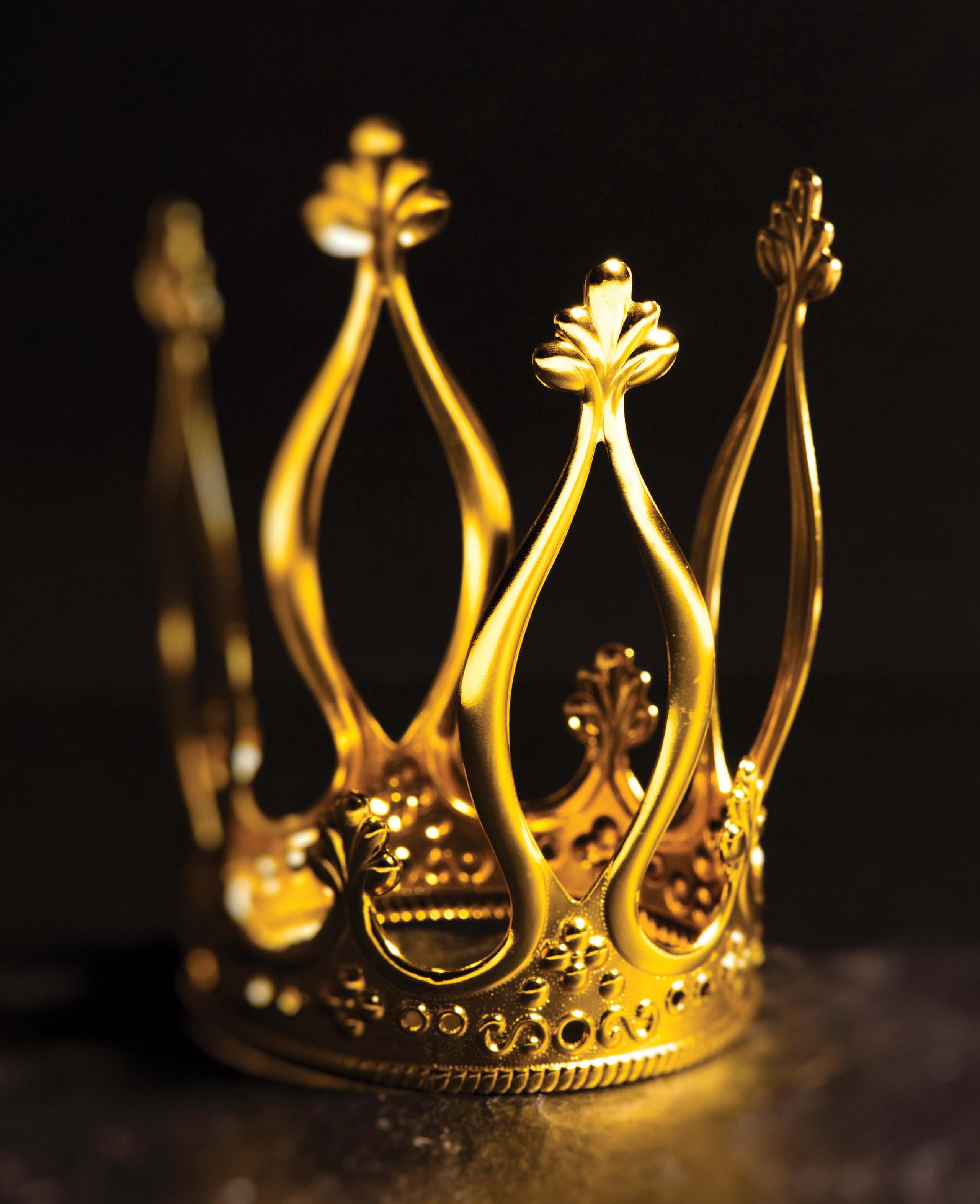
••• UNDERSTANDING THE FEAST OF TRUMPETS (PAGE 8)
INTERNATIONAL CHRISTIAN EMBASSY JERUSALEM // AUGUST 2023 // USA EDITION
The International Christian Embassy Jerusalem was established in1980 in recognition of the biblical significance of all of Jerusalem and its unique connection to the Jewish people. Today the ICEJ represents millions of Christians, churches, and denominations to the nation and people of Israel. We recognize in the restoration of Israel the faithfulness of God to keep His ancient covenant with the Jewish people. Our main objectives are:
• To stand with Israel in support and friendship;
• To equip and teach the worldwide church regarding God’s purposes with Israel and the nations of the Middle East;
• To be an active voice of reconciliation between Jews, Christians, and Arabs, and to support the churches and congregations in the Holy Land.
From its head offices in Jerusalem, the ICEJ reaches out into more than 170 countries worldwide, with branch offices in over 90 nations.
Our vision is:
• To reach every segment of Israel’s society with a Christian testimony of comfort and love, and
• To reach and actively represent to Israel the support of denominations, churches, and believers from every nation on earth.
The Christian Embassy is a non-denominational faith-based ministry supported by the voluntary contributions of our partners and friends across the globe. We invite you to join with us as we minister to Israel and the Jewish people worldwide by donating to the ongoing work and witness of the ICEJ.
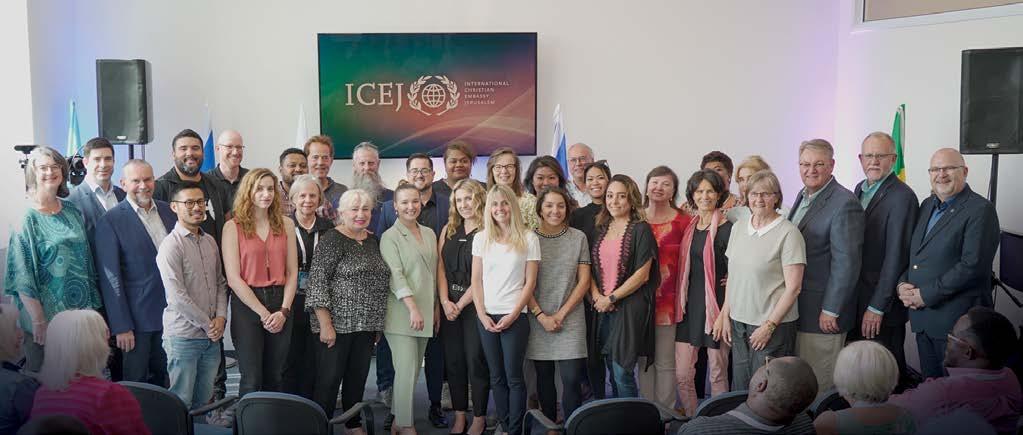

“Then the nations which are left all around you shall know that I, the LORD, have rebuilt the ruined places and planted what was desolate. I, the LORD, have spoken it, and I will do it.”
(Ezekiel 36:36)
CREDITS
ICEJ President Dr. Jürgen Bühler
USA Director Susan Michael
VP International Affairs Dr. Mojmir Kallus
VP Finance David van der Walt
VP Operations Barry R. Denison
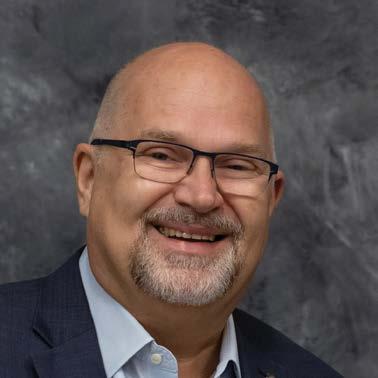
VP International Spokesman David Parsons
VP AID & Aliyah Nicole Yoder
Managing Editor/Publications Director Laurina Driesse
USA Managing Editor Karen Engle
Staff Writer Anastasiya Gooding
Graphic Design/Illustrators Ryan Tsuen, Peter Ecenroad, Nancy Schimp
Photography Shutterstock, Adobe Stock, AP, AFP, JAFI, Flash90, Haaretz, Reuters, IDF, businessweek.com, Netafim, newatlas, SanDisk, Watergen, Waze, Wikimedia Commons, Levi Dörflinger, ICEJ Staff and Branches
The New King James Bible is used for all Bible references unless otherwise noted.
Word From Jerusalem is published by the International Christian Embassy Jerusalem. Reproduction in whole or in part without written permission is prohibited. Word From Jerusalem has no subscription price and is supported through contributions worldwide. The ICEJ USA Branch is a 501(c)(3) non-profit organization with offices in Tennessee, Florida, and Washington, DC. All gifts to this ministry are tax-deductible according to United States law.
INTERNATIONAL CHRISTIAN EMBASSY JERUSALEM - USA
Support our ministry online at: www.icejusa.org
Dear friends,
It is an exciting time to be alive! Amid worldwide turbulence and spiritual upheavals, evidence of God’s “handwriting” is everywhere, specifically through fulfilled prophecy related to Israel, making the times we live in all the more exciting.

Israel is the most significant proof in modern times that God is alive: restored nature, changed long-term weather patterns, rebuilt cities, a reborn Hebrew language, a mass return from the nations, worldwide blessing in science and research, her survival against all odds in multiple wars—the list goes on and on. God is, without a doubt, restoring Zion. And as you will read in this issue, we might well be on the verge of a spiritual restoration of God’s beloved people, adding a new and exciting dimension to God’s prophetic fine-tuning in the Land.
We can also see God’s “handwriting” in how He is opening eyes and hearts to understand His feasts. In the second article in our year-long series about God’s appointed times (pp. 8–10), you’ll learn about the Feast of Trumpets (Yom Teruah)— the next feast on the biblical calendar (in September), which kicks off the season of the fall feasts, culminating with the Feast of Tabernacles in late September/early October.
ICEJ Vice President and Senior Spokesman David Parsons also explores the significance of the phrase “God is the King of all the earth” in Psalm 47:7, the verse from where we took this year’s Feast of Tabernacles theme (see pages 4–6). He helps bring an understanding of God’s redemptive plan for the world by exploring how that plan has played out through time through Israel’s differing rulership.
As you read this issue, prayerfully consider standing with us as we are your extended hands and feet in Israel, the land of miracles. Also pray about attending the Feast of Tabernacles from September 29 to October 6, where you can confess God as King alongside thousands of others from the nations, declaring with Ezekiel: “We know that the LORD has rebuilt the ruined places and planted what was desolate”—and give Him glory for it. I hope to see you there!
Dr. Juergen Buehler President
International Christian Embassy Jerusalem
COVER PHOTO: Crown (Adobe Stock)
FOR MAGAZINE ARCHIVES visit www.icejusa.org/wfj
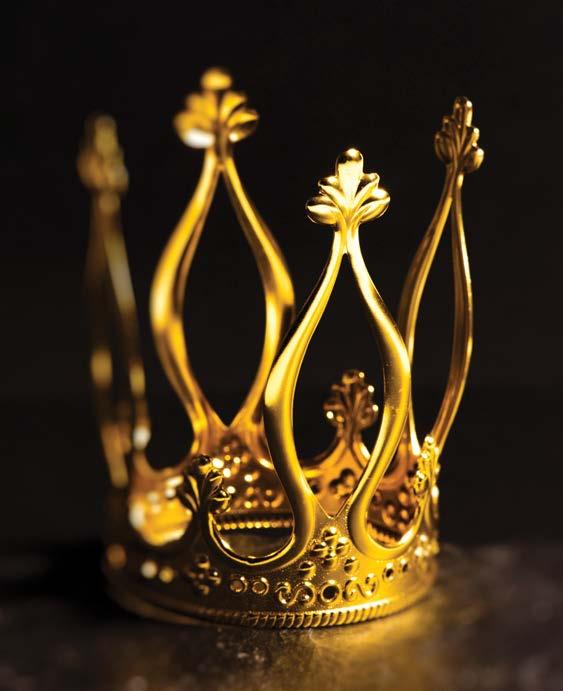
King OF ISRAEL & ALL THE EARTH UNDERSTANDING THE FEAST OF TRUMPETS (PAGE 8) INTERNATIONAL CHRISTIAN EMBASSY JERUSALEM // AUGUST 2023 // USA EDITION FROM JERUSALEM WORD FROM JERUSALEM
FROM THE PRESIDENT'S DESK

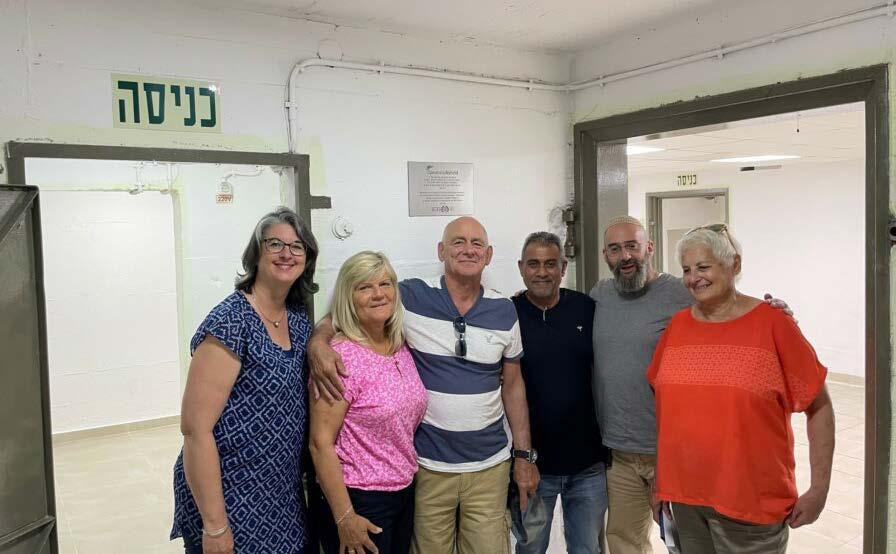

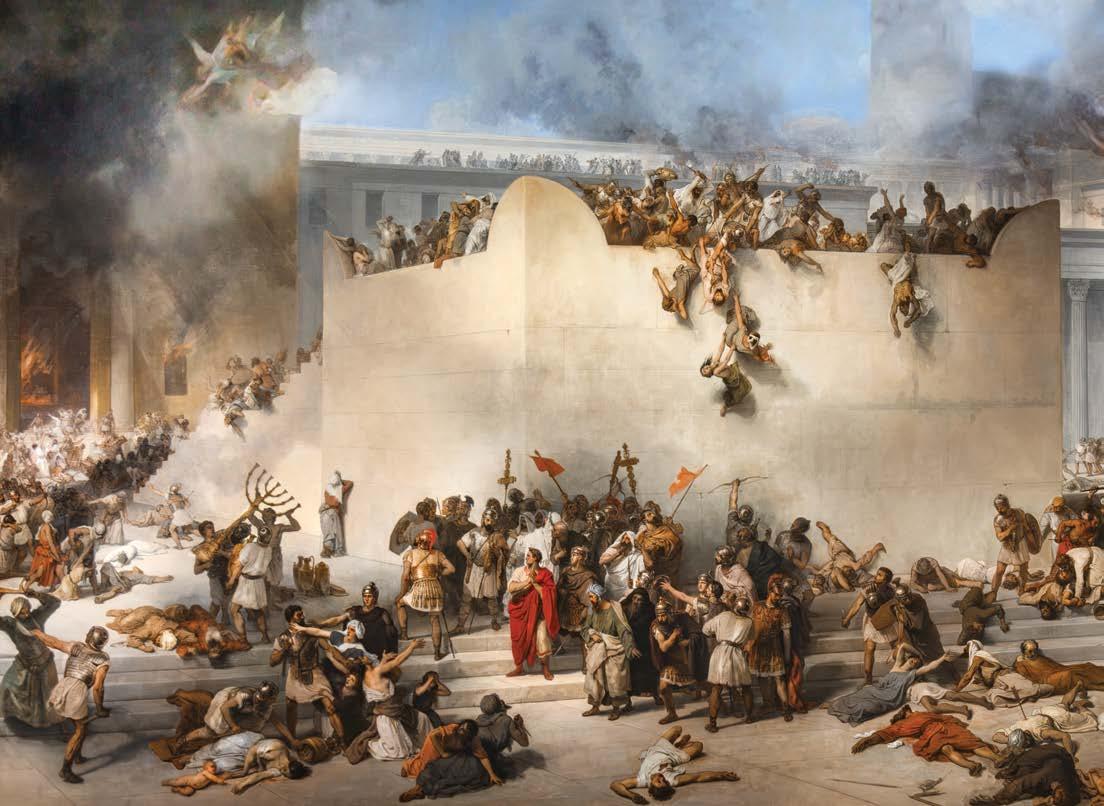
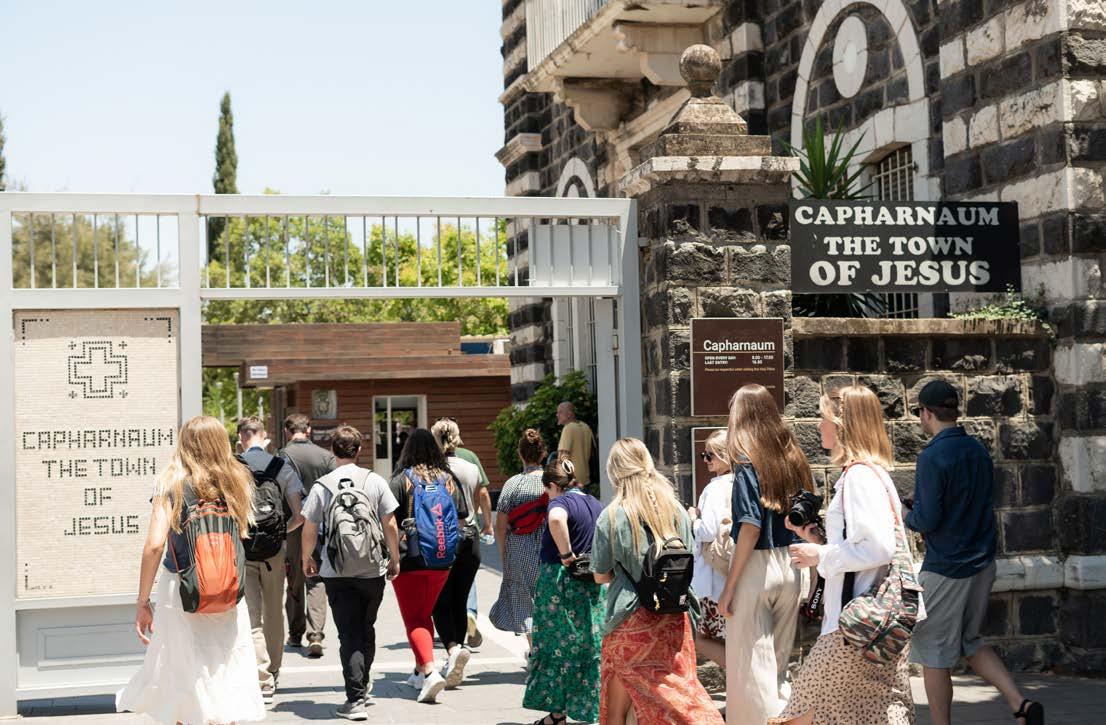
CONTENTS AUGUST 2023 USA EDITION 11 FEATURED TEACHING KING OF ISRAEL & ALL THE EARTH 4 UNDERSTANDING THE FEAST OF TRUMPETS (YOM TERUAH) 8 11MERCY TRIUMPHS OVER JUDGMENT 13 BOMB SHELTER UPGRADES PROVIDE SECURITY 14 ICEJ USA YOUNG ADULT TOUR
KING of ISRAEL ALL the EARTH!
BY DAVID PARSONS, VICE PRESIDENT & SENIOR SPOKESMAN
Our Feast theme this year is taken from Psalm 47:7: “For God is the King of all the earth.”
This speaks of Creator God who rules over all He has made, even those who do not acknowledge His existence. He reigns supreme over all things, which were made for His enjoyment and splendor: “Thou art worthy, O Lord, to receive glory and honor and power: for thou hast created all things, and for thy pleasure they are and were created” (Revelation 4:11, KJV).
When we consider earthly kings, we often think of sovereignty—the right and authority

to rule over a people. Do they have sole, absolute authority? Or is it limited by some compact with the king’s subjects? Hopefully, he is a benevolent monarch. And those with victorious armies, grand palaces and immense wealth often leave a legacy.
Yet of all the kings in human history, none stand out quite like King David. Under his rule, the kingdom of Israel took on a glory and fame that resonates to this day. Of course, his son Solomon only added to that majestic aura when he built the temple in Jerusalem, transforming it into a city of universal significance and acclaim.

4 | August 2023 ICEJ TEACHING
King David Playing the Harp (1622) by Gerard van Honthorst (Wikipedia)
Even today, kings do not look to the Egyptian pharaohs and Roman emperors of the past as their models for emulation. They look to King David! We witnessed this in the recent coronation of King Charles III in Great Britain. Whatever one thinks of Charles’ character and globalist agenda, it was astonishing to watch his traditional coronation ceremony in Westminster Abbey infused with so many powerful passages from Scripture and so much symbolism from the Davidic line.
For instance:
• Charles was anointed with a special oil from the Mount of Olives scented with spices from the Holy Land, much like David was anointed by Samuel (1 Samuel 16:13) and Solomon by Zadok (1 Kings 1:39).
• Trumpets were blown in the Abbey just like when Solomon was crowned king according to David’s instructions, who also gave us the phrase “God save the king” (1 Kings 1:34).
• Charles was handed a “scepter of equity,” reminiscent of Israel’s kings (see Psalm 45:6).
• Charles sat on an old wooden throne that rested on the “Stone of Scone” (or “Destiny”), which Scottish legend claims was the rock upon which Jacob laid his head and dreamed of a ladder to heaven (Genesis 28:10–12) and where Davidic kings later sat when crowned.
Yet the fact that King David would be the forerunner and prototype of the Messiah is something of an enigma. This is because God made clear to ancient Israel that He was their King, and thus they did not need an earthly king.
As my colleague Dr. Juergen Buehler pointed out in the last issue of the Word From Jerusalem magazine, when God brought Israel out of Egypt, He called them to be “a kingdom of priests and a holy nation” (Exodus 19:6). And God Himself became their “king in Jeshurun” (Deuteronomy 33:5). For He alone was worthy to rule and reign and give direction to this people.
Yet later, Israel insisted on having an earthly king like the other nations around them, a demand that sorely displeased God. It happened under the prophet Samuel, who complained to the Lord and received this reply: “Heed the voice of the people in all that they say to you; for they have not rejected you, but they have rejected Me, that I should not reign over them” (1 Samuel 8:6–7).
So how could God go from forbidding Israel an earthly king to allowing one? And how was this earthly king suddenly elevated to being the progenitor of the King Messiah—that is, Jesus, both the Son of David and Son of God!
FLAWED KINGS, BUT A FAITHFUL GOD
To unlock this riddle, it first must be noted that the people were demanding a king most likely out of fear that what happened under Eli the priest would occur again once Samuel was gone. Recall that Eli had not disciplined his sons, who were robbing the people at Shiloh, and God sent such a harsh judgment and defeat that the ark of the covenant wound up in the hands of the Philistines. An aging Samuel had just appointed his two sons as judges, and they too were not corrected for their corruption, just like the sons of Eli, causing the Israelites to fear what might lie ahead (1 Samuel 8:1–3). So they actually had a legitimate cause to be concerned.
heed their voice. However, you shall solemnly forewarn them, and show them the behavior of the king who will reign over them” (1 Samuel 8:9).
So Samuel spelled it out clearly, that these kings would surely turn their sons into his servants and soldiers, take their daughters as his cooks and concubines, and heavily tax their crops and livestock. And if they came complaining to the Lord about it, He would not hear them (1 Samuel 8:10–18).
Orthodox priests in Jerusalem prepare the anointing oil from the Mount of Olives for the coronation of King Charles III. (Getty Images)

Whether that legend is true or not, the main takeaway is that the monarchs of Britain and most other European thrones have all historically looked to the royal House of David as the highest and purest example of a Godordained king. And the Christian themes and symbols present in these European coronations over the centuries are rooted in the belief that Christ is the rightful heir to the throne of David.
Second, God already knew Israel would demand a king long before they actually did so (Deuteronomy 28:36) and had preemptively set out certain rules and restrictions for these kings in the Law of Moses. We find these in Deuteronomy 17:14–20, which instructs the Israelites to make sure to select a king of God’s choosing—one who would not enrich himself by demanding their gold and silver and livestock or take their daughters as wives, one who would fear the Lord and keep His word.
So when Samuel faced the mob demanding a king, the Lord permitted it but told the prophet to sternly warn the people concerning the kind of ruler they were about to get: “Now therefore,
Then when Samuel coronated Saul as Israel’s first king, he prayed for the Lord to give the people a sign they indeed had committed an error, and the Lord answered by sending rain and thunder in the time of the wheat harvest, which is normally a dry season. Yet Samuel also assured the people that God would remain by their side, saying:
Do not fear. You have done all this wickedness; yet do not turn aside from following the Lord, but serve the Lord with all your heart … For the Lord will not forsake His people, for His great name’s sake, because it has pleased the Lord to make you His people. (1 Samuel 12:20, 22)
Therefore, we can conclude that God had not changed His mind about Israel, but rather He knew they would one day demand an earthly king. It was just a difficult moment to go through for the Lord and for the prophet Samuel given the sense of rejection they both felt.
THE PATH TO ROYAL PRIESTHOOD
Finally, it is fascinating to note a clear pattern in the changing modes of leadership ancient Israel went through. For roughly their first 400 years, they were led by Patriarchs, from Abraham to Moses. Then for the next 400 years, they were ruled by Judges from Joshua to Samuel. After that came 400 years of rule under the kings of

ICEJ TEACHING
Trumpeters announce the recent coronation ceremony in London’s famed Westminster Abbey. (Facebook/Westminster Abbey)
5 |WORD FROM JERUSALEM
Israel and Judah, from Saul and David to Josiah, the last upright king in the Davidic line. Finally, over the next 400 years, Israel was basically ruled by a royal priesthood.

We can see Israel’s priestly role coming to the fore as the children of Israel returned from Babylonian exile and anointed Joshua, the high priest, to rule the people. This key moment of transition for Israel is recounted in Zechariah 3. If the Jews returning from exile had placed a king over themselves, their Persian overlords would have been upset. So to play it safe, they appointed Joshua, the high priest, as their head.

Remarkably, God sent a prophetic word through Zechariah endorsing this move. Why? Because “My servant the Branch” was coming to “remove the iniquity of that land in one day” (Zechariah 3:8–9). Thus, Israel was essentially ruled by a royal priesthood so that, in due time, they might offer up the sacrificial Lamb for the sins of the world.

In all this, we can see God’s redemptive plan for the whole world playing out in Israel’s journey down through time under different forms of rulership. The Patriarchs received God’s sworn covenant promises to bless and redeem the world through their descendants. The Judges helped possess the promised land where redemption would play out. King David was promised a son who would one day rule over an eternal kingdom, and he became the precursor for the King Messiah and the envy of all earthly kings ever since. And that promised Son of David gave himself up as a sacrifice for the sins of the world, thereby earning what was already rightfully His: the eternal throne of David, from where He will rule over Israel and all the earth forever.
THIS SOON-COMING KING
With all this in mind, it is encouraging to consider all the prophetic passages still awaiting ultimate fulfilment concerning this most worthy Son of David, who is the “Desire of all Nations” (Haggai 2:7) and “King of all the Earth.”
For instance, the prophet Hosea speaks of a long season when Israel would have neither kings nor priests, but one day that would change:
For the children of Israel shall abide many days without king or prince, without sacrifice or sacred pillar, without ephod or teraphim. Afterward the children of Israel shall return and seek the Lord their God and David their king. They shall fear the Lord and His goodness in the latter days. (Hosea 3:4–5)
Note here that the prophet is speaking well after King David was dead and buried, which means he is clearly referring to the King Messiah to come. And the promise is that Israel will not only accept this Messiah but earnestly seek Him.
The prophet Isaiah speaks of the everlasting nature of Messiah’s kingdom:
Of the increase of His government and peace there will be no end, upon the throne of David and over His kingdom, to order it and establish it with judgment and justice from that time forward, even forever. The zeal of the Lord of hosts will perform this. (Isaiah 9:7)
Jeremiah speaks of His righteous rule: “I will raise to David a Branch of righteousness; a King shall reign and prosper, and execute judgment and righteousness in the earth”(Jeremiah 23:5).
Elsewhere, Jeremiah assures that Israel will serve this Messiah: “But they shall serve the Lord their God, and David their king, whom I will raise up for them” (Jeremiah 30:9). Again, in the days of Jeremiah’s prophetic ministry, David was already in his grave, so this is speaking of the King Messiah.
Another incredible prophetic vision came through Ezekiel, at a time when the kingdoms of Israel and Judah were bitterly divided, at war with each other, and hopelessly headed for exile. Yet the Lord vows that one day:
Surely I will take the children of Israel from among the nations, wherever they have gone, and will gather them from every side and bring them into their own land; and I will make them one nation in the land, on the mountains of Israel; and one king shall be king over them all; they shall no longer be two nations, nor shall they ever be divided into two kingdoms again. … David My servant shall be king over them, and they shall all have one shepherd; they shall also walk in My judgments and observe My statutes, and do them. … and My servant David shall be their prince forever. (Ezekiel 37:21–25)
Finally, the prophet Zechariah foresees the day when “the Lord shall be King over all the earth” (Zechariah 14:9). He also sees a vision of the nations flocking to Jerusalem “to worship the King, the Lord of hosts, and to keep the Feast of Tabernacles” (Zechariah 14:16).
This is your invitation, straight from the pages of Scripture, to come worship King Jesus at this year’s Feast. There is no better way to prepare your heart to receive Him at His soon coming!
ICEJ TEACHING LEARN MORE ABOUT THE FEAST AND REGISTER TODAY AT: WWW.ICEJUSA.ORG/FEAST-TOUR
Raise the Banner Dance Team at the Feast of Tabernacles, 2022

Speak to the children of Israel, saying: “In the seventh month, on the first day of the month, you shall have a sabbath-rest, a memorial of blowing of trumpets, a holy convocation. You shall do no customary work on it; and you shall offer an offering made by fire to the Lord.”
(Leviticus 23:24–25)
Understanding the Feast of Trumpets (Yom Teruah)
 KAREN ENGLE, ICEJ USA MANAGING EDITOR
KAREN ENGLE, ICEJ USA MANAGING EDITOR
As summer winds down, the Jewish people begin thinking of the fall feasts, beginning with Yom Teruah—September 15–17 this year. Also known as the Feast of Trumpets, Yom Teruah is a unique feast God set with Israel that’s unlike any other. The Bible doesn’t offer much information about this holy day—the only instructions God gave Israel for how to celebrate it are found in Leviticus 23:23–25 and Numbers 29:1:
In the seventh month, on the first day of the month, you shall have a sabbath-rest, a memorial of blowing of trumpets, a holy convocation. You shall do no customary work on it; and you shall offer an offering made by fire to the Lord. (Leviticus 23:24–25)
And in the seventh month, on the first day of the month, you shall have a holy convocation. You shall do no customary work. For you it is a day of blowing the trumpets. (Numbers 29:1)
On Yom Teruah, Israel was to blow trumpets, rest, assemble as a nation, and make an offering of fire to God. Over time, because of the focus on blowing trumpets, Yom Teruah became known as the “Day of Blowing Trumpets” or the “Day of the Awakening Blast.” It might appear to be a straightforward feast— but for ancient Israel, knowing when to celebrate Yom Teruah was tricky.
The “Hidden” Day
Yom Teruah was to be celebrated on the first day of the seventh Hebrew month (known as Tishri in Hebrew), our September/October. In biblical times, a Hebrew month was either 29 or 30 days, and determining those days depended on the moon cycle. As the moon began to wane from the previous month (Elul, in Hebrew), anyone watching the evening sky could know the general time frame that the next month, Tishri, would begin—they just didn’t know the exact day. Once two witnesses confirmed that the first sliver of the new moon was visible, the month of Tishri began—and thus, the first fall feast: Yom Teruah. Because the exact start of Yom Teruah was unknown, several other idioms for this feast developed over time, two of which are “The Hidden Day” and “The Day and the Hour No Man Knows.”
Though God’s purpose in establishing Yom Teruah isn’t clear, the name itself gives us a clue: teruah means “alarm, signal, battle cry, or shout of joy.” Think of Jericho when Israel’s
armed men marched around the city, gave a loud shout (teruah), and as the children’s song goes, the “walls came tumbling down.”
So it shall be in that day: the great trumpet will be blown; they will come, who are about to perish in the land of Assyria, and they who are outcasts in the land of Egypt, and shall worship the Lord in the holy mount at Jerusalem. (27:13; see also Joel 2:1)
Most importantly, the trumpet sound is related to hailing God as King over all. Psalm 98:6 says, “With trumpets and the sound of a horn; shout joyfully before the Lord, the King.”
Though Yom Teruah isn’t mentioned clearly in the New Testament, in Jesus’ day, it was marked by a blast of the ram’s horn that alerted God’s people to remember Him, wake up and pay attention, and repent before His judgment fell. Outside of these fragments of information, Yom Teruah is still a bit of a mystery for Jews—and gentiles.
There are also numerous instances in both the Old and New Testaments where the blowing of a shofar (ram’s horn) or trumpet is related to an activity; reading those Scriptures can bring insight to what this peculiar feast might be pointing to. For example, a trumpet blast was used to announce a new month and coronate kings. But they were also blown
• to sound alarms for Israel (Numbers 10:5–6; Ezekiel 33:3; Joel 2:1)
• to call the people to assemble (Exodus 19:13; Psalm 81:4–6)
• to announce a Jubilee year (Leviticus 25:9–10)
• when making offerings and sacrifices (Numbers 10:10)
• to prepare the way for military campaigns (Numbers 10:9; 2 Chronicles 3:12; Judges 7:22)
• to wage war (Joshua 6:4–20)
• for temple worship and praise (2 Chronicles 15:14; Psalm 47:6; 89:16)
• to convey a message (1 Corinthians 14:8)
Isaiah says the sound of the shofar will also signal Israel’s redemption during the Day of the Lord at the end of the ages:
Yom Teruah, Rosh Hashanah—or Both?
Today, few people remember the biblical name for this feast; instead, it is widely known as “Rosh Hashanah,” which means “head of the year,” marking the beginning of the Jewish new year. Some denominations in Judaism blow the shofar 100 times during Rosh Hashanah to call people to confession and repentance. On this day, a series of reverberating shofar blasts make three sounds, but it’s the last one that is particularly moving—one long uninterrupted blast held as long as possible.
Though it’s a day of joy, it also carries solemn tones, for on Rosh Hashanah, Jews remember God as Judge and believe it is the day the Book of Life and heaven’s gates are opened. Rosh Hashanah initiates 10 days of introspection and repentance, known as the “Days of Teshuvah” or “Days of Awe,” that lead to the next feast on God’s calendar: Yom Kippur, or the Day of Atonement.
Teshuvah means “to return” or “to come back” or, more simply, to turn toward God. During these 10 days, the shofar is sounded daily to alert the faithful that the Book of Life will soon close and the time to repent is at hand. Jewish people take time to repent of their sins for the previous year and do good deeds in hopes they will not be “blotted out” of the book before it is “closed” on Yom Kippur. Rosh Hashanah is thus a wake-up call to correct wrong behavior and return to and worship God alone.
ICEJ TEACHIING
for Yom Teruah One Long Day Day of Remembrance The Hidden Day The Day and the Hour No Man Knows The Day of the Awakening Blast Wedding of the Messiah The Coronation of the Messiah The Day of Judgment Opening of the Books Opening of the Gates The Time of Jacob’s Trouble 9 |WORD FROM JERUSALEM
Idioms
The Sound of the Trumpet
Despite our vague information about this feast, Scripture offers other clues that can help us put the pieces together. Several end-time prophecies connected to Jesus’ return include the trumpet sound. When we consider them alongside what we know about when trumpets were sounded in ancient Israel—and why—we get a glimpse of how Jesus might fulfill Yom Teruah:
• A trumpet sound will precede the Day of the Lord (Joel 2:1) when Jesus returns as King to overthrow gentile nations dominating Jerusalem.
• The “last trumpet” will accompany the resurrection of the dead (1 Corinthians 15:52).

• The last of seven trumpets will sound when “the kingdoms of this world have become the kingdoms of our Lord and of His Christ, and he shall reign forever and ever” (Revelation 11:15).
• Zechariah 9:9–14 and Isaiah 27:12–13 connect the blowing of the shofar with Israel’s salvation, the ingathering of the exiles, and the coming of her King.

• The dead will be resurrected at the sound of the last trumpet (1 Corinthians 15:51–52).
• The Lord will come down “with a shout, with the voice of an archangel, and with the trumpet of God,” and all the saints will be “caught up” to meet Jesus in the air (1 Thessalonians 4:14–16).
Yom Teruah clearly foreshadows the season of Jesus’ return to Earth—yet even learned scholars debate the details of this feast and how exactly Jesus will fulfill it. The Christian need only dig into a study of God’s Word about this feast, the sound of the trumpet, and that sound’s connection to repentance, battle, waking from slumber, watching, coronation, worship, praise, preparation for judgment, and restoration to God to come up with some ideas.
Clearly, Yom Teruah—the Feast of Trumpets—is a prophetic harbinger of the return of Jesus.
Keep learning about the significance of God’s feasts in the September issue of Word From Jerusalem, when we will explore the Day of Atonement—Yom Kippur.
What Does the Trumpet Sound Represent?
The word “trumpet” shows in Scripture for the first time in Exodus 19:19 at Mount Sinai: “When the blast of the trumpet (shofar) sounded long and became louder and louder, Moses spoke, and God answered him by voice.” Here, Moses connects the trumpet sound that thundered with lightning flashes and a thick cloud on Mount Sinai with God’s voice.
In the New Testament, the writer of Hebrews says of this event at Mount Sinai: “You have not come to the mountain that may be touched and that burned with fire … and the sound of a trumpet and the voice of words, so that those who heard it begged that the word should not be spoken to them anymore” (12:9). And in Revelation 1:10, John describes being in the Spirit when he heard behind him “a loud voice, as of a trumpet, saying, ‘I am the Alpha and the Omega, the First and the Last’” (Revelation 1:10; see also Revelation 4:1). Notice all these verses seem to connect the words “sound,” “voice,” and “trumpet” one to each other.
Because the trumpet sound in the Old Testament relates to God’s voice, and because Jesus declared himself the Alpha and Omega in Revelation (the Word of God made flesh who spoke creation into being; see Psalm 33:9), we can relate the sound of a trumpet blast to Jesus’ voice. The trumpet sound is the mere “shadow” of the voice of God that will be heard when Jesus returns to Earth, with a loud command, with the voice of the archangel, “and with the trumpet of God” when the dead in Christ rise first.
This makes Psalm 89:15 even more beautiful: “Blessed are the people who know the joyful sound (Heb. teruah = shout, signal, alarm, or joy)! They walk, O LORD, in the light of Your countenance.” Those who “know” the voice of Jesus are indeed blessed: My sheep hear My voice, and I know them, and they follow Me. And I give them eternal life, and they shall never perish; neither shall anyone snatch them out of My hand. (John 10:27)
ICEJ TEACHIING 10 |August 2023
MERCY TRIUMPHS OVER JUDGMENT

THE SUMMER MONTHS ON THE HEBREW CALENDAR
 BY DR. MOJMIR KALLUS, ICEJ VICE PRESIDENT FOR INTERNATIONAL AFFAIRS
BY DR. MOJMIR KALLUS, ICEJ VICE PRESIDENT FOR INTERNATIONAL AFFAIRS
The main biblical festivals (feasts) divide the year into seasons. Pesach (Passover) and Shavuot (Pentecost) are spring feasts at the beginning of the agricultural season, while Sukkot (Tabernacles) marks the fall harvest. Between them comes the long, hot Israeli summer, with blue skies and not even a drop of rain. For ancient farming societies, summer was a time of laboring in the fields. No major holidays are observed during the summer months of Tammuz, Av, and Elul. Yet each month carries a spiritual message.
One theme resonates throughout the summer months: mourning the tragedies in Jewish history, in particular the destruction of the temple. It starts in Tammuz with the fast of the fourth month on Tammuz 17 (July 6 of this year), which commemorates the day when the walls of Jerusalem were breached: “In the eleventh year of Zedekiah, in the fourth month, on the ninth day of the month … the city wall was broken through” (Jeremiah 52:6–7). Six hundred years later, at approximately the same time, the walls of Jerusalem were breached by the Romans in AD 69. In both cases, the temple was soon destroyed.

Tammuz 17 marks the beginning of a period known as “the three weeks.” This is an annual mourning period, when Jews mourn the destruction of the temple and consider the cause of their exile. It is a time of repentance and soul-searching, which concludes with the fast of the Ninth of Av (Tisha B’Av in Hebrew), when both temples were set aflame (423 BC and AD 69). Numerous other tragedies also occurred in Jewish history during this period, so tradition says rejoicing during these three weeks should be diminished. On Tisha B’Av, Lamentations is read in the synagogues, and the Jewish people reflect on the causes of these tragedies.
In contrast, immediately following Tisha B’Av and continuing for seven weeks into the month of Elul, is a period called the “seven weeks of comfort,” or Menachem Av (“consoling Father”). Menachem in Hebrew is a variant of the word nachamu, which appears in Isaiah 40:1—nachamu
ami or “comfort my people.” Interestingly, in Jewish tradition there is a strong connection between Tisha B’Av and this passage from Isaiah. The Shabbat following the Ninth of Av is called Shabbat Nachamu, and as a Haftara (prescribed reading from the prophets), this portion of Isaiah 40 is read. God is their Father, and He comforts His chosen people.
This is of particular importance to the ICEJ, as our founding mandate from 1980 was and remains “nachamu, nachamu ami” (“Comfort, yes, comfort My people”). It is good to know that in rabbinic tradition, this verse is closely connected to Tisha B’Av and the idea of God consoling His people after a great tragedy. In fact, Jewish sages have said that the destruction and exile go hand in hand with redemption. Indeed, the “comfort” of Isaiah 40:1 heralds the coming Messiah.
It turns out that comforting Israel is not just some humanitarian mission—it is deeply spiritual and prophetic.
We also see this connection in the Greek translation of Isaiah 40:1 in the Septuagint, which is parakaleite ton laon mou. Here, the word for “comfort” has the same root as the Greek word Parakletos, the “Comforter,” the New Testament term for the Holy Spirit.
It follows that such act of comfort is Divine activity, inspired by the Holy Spirit. The Parakletos does the comforting, not merely human efforts. When God commands us to “comfort My people” in Isaiah 40, it means that God has given gentile believers a ministry of comfort led by the Holy Spirit. And truly, we cannot comfort Israel without His Spirit.
So the ultimate message of this summer period of remembering all of Israel’s tragedies is that mercy triumphs over judgment. We live at a time when God is comforting His people again. And inspired by the Holy Spirit, we as gentile believers can “speak to the heart of Jerusalem, and cry out to her, that her warfare is ended, that her iniquity is pardoned; for she has received from the Lord’s hand double for all her sins” (Isaiah 40:2).
11 | WORD FROM JERUSALEM
ICEJ PRAYER
LIFE-CHANGING EQUIPMENT FOR ONE OF ISRAEL’S TOP MEDICAL CENTERS

 BY ANNALIESE JOHNSON ICEJ PUBLICATIONS/EVENTS REGISTRATION
BY ANNALIESE JOHNSON ICEJ PUBLICATIONS/EVENTS REGISTRATION
Israel is widely known today for its advanced medical facilities and research centers, to the point that many foreigners come here as “medical tourists” to receive treatments in Israeli hospitals. But sometimes these hospitals run short on key medical equipment needed to serve Israel’s own growing population.

Recently, the International Christian Embassy Jerusalem provided lifesaving equipment to the Kaplan Medical Center emergency room, one of Israel’s leading and busiest hospitals, in Rehovot. Kaplan’s emergency room is considered the “heartbeat” of the hospital.
Kaplan Medical Center was originally formed out of army barracks in 1953 to serve 50,000 residents, but now it provides services for approximately 1 million Israelis. Currently run by Dr. Tarif Bader, a highly respected medical professional from the Druze community, the hospital serves many Holocaust Survivors, 40 percent of the Ethiopian Jewish community in Israel, a significant portion of the country’s ultra-Orthodox Jews, and various minority groups. In addition to providing services for Israel’s diverse population, the hospital also treats Palestinians from Gaza.
Dr. Tarif is no stranger to high influxes of patients and trauma. Before his role at the hospital, he served in the Israel Defense Forces (IDF), where he was responsible for the medical care offered to wounded Syrians crossing the Israeli border during the Syrian civil war. (This was part of the IDF’s “Operation Good Neighbor” initiative, which the ICEJ also supported.) However, with the steadily growing population within Israel, the emergency room at Kaplan Hospital needed to acquire and upgrade missing or old equipment to care for patients properly.
Thanks to your generous donations, the ICEJ donated a blood warmer and three defibrillators. The blood warmer, which can warm blood to body temperature in 35 seconds, helps greatly with saving lives every day. Meantime, the defibrillators give off electric impulses that can be the difference between life and death during cardiac arrest.
The final gift, special lighting needed for surgical procedures, will soon arrive. This device is a game-changer for victims of car accidents and other traumas whose care requires specific, focused lighting. Before this donation, surgeons
often had no alternative but to use phone flashlights to deal with serious injuries.
“We really, really thank you. The equipment is easy to use. And it helps us save lives,” assured Dr. Arkadi Shkaliar, who runs the emergency room.
Indeed, these gifts help reduce doctors’ stress, while the ease of operating the devices helps ensure critical and timely care for all emergency room patients. In response to a severe shortage of qualified medical professionals in Israel, the ICEJ is also sponsoring a recertification program for new immigrant doctors, which brings more medical professionals into the field. We are proud to help improve medical services in Israel and contribute toward bridging urgent personnel gaps that can aid in preventing burnout of dedicated Israeli doctors.
These contributions to Israel’s medical field are part of the ICEJ’s “A Future and a Hope” initiative, which seeks to provide practical assistance to every sector of Israeli society— whether old or young, Arab or Jew, native-born or new arrival.
ICEJ AID 12 |August 2023 ICEJ PROVIDES
consider partnering with us today. DONATE AT: www.icejusa.org/aid
Please
ICEJ Vice President of AID and Aliyah Nicole Yoder and Kaplan Medical Center Emergency Room Director Dr. Arkadi Shkaliar
Kaplan Medical Center equipment
BOMB SHELTER UPGRADES PROVIDE SECURITY TO ISRAELI COMMUNITY
BY LAURINA DRIESSE, ICEJ HEAD OF MEDIA & PUBLICATIONS
Residents of Southern Israel are regrettably no strangers to the sound of red alert sirens that signal the approach of a terrifying rocket attack. With only seconds to run to safety, it can be a matter of life or death if a bomb shelter is not nearby. Until recently, this was the situation for the Jewish community of Kibbutz Dorot, located 8 kilometers (5 miles) from northeast Gaza.
Kibbutz Dorot was established during Hanukkah in 1941 by Jewish refugees from Germany who farmed grain, fruit trees, and vegetables. From its humble beginnings, it has grown to a population of over 870, with native Israelis and new Jewish immigrants settling in the kibbutz.
The kibbutz has two underground bomb shelters, which over the years became unusable. But thanks to the Christian Embassy’s generous donors, we were able to renovate the shelters and make them fully functional again.

The contractors renovated the bathrooms, added a small kitchenette area, gave the shelter a fresh coat of paint, and installed a ventilation system with special pumps that remove moisture from the air to prevent dampness and mold.
“All corners, walls, and step edges were painted with reflective paint to be visible in pitch darkness. This is especially important if there is an electrical failure due to the rocket attacks,” said the contractor, Ofer Tabash.
The two underground shelters are centrally located on the kibbutz. The larger shelter is located next to a dining hall and a grocery store and is close to a cultural center. Meanwhile, the second, slightly smaller shelter is located near the student dorms for Sapir College.

These shelters are multifunctional. During peaceful times, they serve as a place for young people and IDF soldiers to gather, listen to music, and enjoy community life. During times of crisis, they are a vital place of refuge.
“Now the new LED lighting, kitchenette, and more make this place renewed and joyful, even in times of crises,” remarked Yael Pruzhan, the former managing director of the kibbutz.
Current manager Dor Efrati added that when the area recently came under intense rocket attack, everyone was grateful to the ICEJ that the shelters were open and running again.
“The restoration of the bomb shelters is crucial to our security in this kibbutz. Thank you, thank
you, thank you!!” exclaimed Efrati. “I want to thank the generous donors for their help in providing our community with shelters and for protecting the residents of Kibbutz Dorot.
“During the recent escalations, the shelters you donated gave our residents a place of safety to go to when the alarm sounded, and of this it is said: ‘Everyone who saves one life in Israel, it is as if they saved the whole world.’”
Nicole Yoder, ICEJ Vice President for AID and Aliyah, shared that since the beginning of the year, the ICEJ has helped Israeli communities with six bomb shelters (both portable and renovated underground shelters), and another eight shelters are now being made.
“This is an amazing achievement, made possible through the partnership of our friends from ICEJ USA, ICEJ Germany, ICEJ Canada, ICEJ Switzerland, and ICEJ Austria. These shelters will bring the total number supplied to Israeli communities to 197. We are so hoping to reach 200 by the Feast of Tabernacles in September,” shared Nicole.
Please partner with us in reaching the goal of providing 200 bomb shelters by Sukkot, the Feast of Tabernacles, to protect vulnerable Israelis during times of crisis.
ICEJ AID
Please donate today at www.icejusa.org/bombshelter 13 |WORD FROM JERUSALEM
Kibbutz Dorot
Adventure in the Promised Land with ICEJ’s Israel Impact Tour for Young Adults


ICEJ USA is bringing the next generation of Israel advocates to the promised land.

It’s 8:00 a.m. on the shores of the Sea of Galilee, and the sunrise is glistening on the water. A group of 20 Christians have boarded a boat to sail the path that Jesus walked. Although hundreds of such Christian tours commence every day, this one is different—its attendees are all young adults from 12 states across the United States.
ICEJ USA staff members Peter Ecenroad and John Vedder, along with Israeli tour guide Eli Biton, are eager to take the group to Israel’s most meaningful locations for the Christian faith.


Looking out over the group taking photos, Ecenroad shared, “It’s everyone’s first time in Israel, and they are so excited to soak up Israel’s history.”
Ecenroad continued, “I’ve been working with young adult trips to Israel for the past 20 years, and it bothered me when the coronavirus pandemic shut down our tours. I was upset about COVID to begin with—everybody was. The shutdown of international travel tested my patience and showed me how much I really believe in these tours.”
Galilee boat ride
Jordan River Rafting
Hezekiah’s Tunnel
14 |August 2023 ICEJ USA REPORT
Noah’s Jordan River baptism
“I want the young adults to take away three things from our journey: to be inspired to draw closer to Jesus, have lots of fun, and show Israel and Judaism’s ‘true face’ to fellow Christians,” Ecenroad exclaimed.
“I want the young adults to take away three things from our journey: to be inspired to draw closer to Jesus, have lots of fun, and show Israel and Judaism’s ‘true face’ to fellow Christians,” Ecenroad exclaimed.
The next day, under a clear blue sky, eight young adults were baptized and made a public confession of faith in the waters of the Jordan River.
The next day, under a clear blue sky, eight young adults were baptized and made a public confession of faith in the waters of the Jordan River.

Twenty-two year old Noah, a college student on pilgrimage from Florida, emerged from the Jordan River beaming with happiness. “It’s like I’m reborn. Being baptized represents new life and my commitment to God.”
Twenty-two year old Noah, a college student on pilgrimage from Florida, emerged from the Jordan River beaming with happiness. “It’s like I’m reborn. Being baptized represents new life and my commitment to God.”
Noah continued, “Being here Israel, walking where Jesus walked and where so many significant things took place, has been awesome. I feel like back home there can be a lot of negative things and darkness that can tend to bring me down. I’m thankful for how encouraging and positive Peter, John, and Eli have been as our leaders during this trip. It’s been amazing!”
At 8:00 a.m. the next day, five buses are lined up at the entrance to Kfar Hanokdim, a desert oasis near Arad in Southern Israel. An energetic group of young adults carrying suitcases and backpacks are putting on helmets and smiling with anticipation.
Noah continued, “Being here in Israel, walking where Jesus walked and where so many significant things took place, has been awesome. I feel like back home there can be a lot of negative things and darkness that can tend to bring me down. I’m thankful for how encouraging and positive Peter, John, and Eli have been as our leaders during this trip. It’s been amazing!”
At 8:00 a.m. the next day, five buses are lined up at the entrance to Kfar Hanokdim, a desert oasis near Arad in Southern Israel. An energetic group of young adults carrying suitcases and backpacks are putting on helmets and smiling with anticipation.
“Two groups just completed a camel ride, and now it’s our turn,” says Vedder. “It’s fun watching some people name their camel and then attempt to take a humorous photo that ends up on Instagram.”
“Two groups just completed a camel ride, and now it’s our turn,” says Vedder. “It’s fun watching some people name their camel and then attempt to take a humorous photo that ends up on Instagram.”
At 9:00 a.m. the next morning, we make our way through the Old City of Jerusalem, where merchants pushing handcarts cry out for the right of way through a procession of monks in rope-belted robes and masses of tourists. Hidden behind a high wall near the start of the Via Dolorosa, we find the 11thcentury Saint Anne’s Church, built next to the Pools of Bethesda. Its cool, geraniumdecked courtyard is an unexpected oasis from the bustle of the ancient city.
At 9:00 a.m. the next morning, we make our way through the Old City of Jerusalem, where merchants pushing handcarts cry out for the right of way through a procession of monks in rope-belted robes and masses of tourists. Hidden behind a high wall near the start of the Via Dolorosa, we find the 11thcentury Saint Anne’s Church, built next to the Pools of Bethesda. Its cool, geraniumdecked courtyard is an unexpected oasis from the bustle of the ancient city.
The church’s acoustics are well suited for our group as we sing “Agnus Dei” and “Bless the Lord O My Soul” at the start of our trek through the sites of the Via Dolorosa. During our journey, our tour sang about redemption through our Messiah at the Mount of Beatitudes, Magdala, Saint Anne’s Church, and the Garden Tomb.
The church’s acoustics are well suited for our group as we sing “Agnus Dei” and “Bless the Lord O My Soul” at the start of our trek through the sites of the Via Dolorosa. During our journey, our tour sang about redemption through our Messiah at the Mount of Beatitudes, Magdala, Saint Anne’s Church, and the Garden Tomb.
Over the centuries, Jerusalem has taken on a redemptive significance, based on its root meaning ir shalom—city of peace—with the hope that it will be restored as a place of harmony, and worship, for all nations. We concluded our time in Jerusalem by praying Psalm 122.
Over the centuries, Jerusalem has taken on a redemptive significance, based on its root meaning ir shalom—city of peace—with the hope that it will be restored as a place of harmony, and worship, for all nations. We concluded our time in Jerusalem by praying Psalm 122.
Twenty-two-year-old Abigail from Tennessee shared, “I feel like the fighting between the Muslims, the Jews, and Christians throughout history—and how there is still a fight over this region of the world—shows how clearly there is a good and an evil in this fight. The Lord has really put on my heart to reach out to Muslims, and I’m about to go into an area where I can share my faith, be bold, and hopefully make a positive difference,” Abigail said.
Twenty-two-year-old Abigail from Tennessee shared, “I feel like the fighting between the Muslims, the Jews, and Christians throughout history—and how there is still a fight over this region of the world—shows how clearly there is a good and an evil in this fight. The Lord has really put on my heart to reach out to Muslims, and I’m about to go into an area where I can share my faith, be bold, and hopefully make a positive difference,” Abigail said.
“The young adults share how they grew to love Israel by reading their Bibles, but after visiting Israel, many express how they are feeling a new push to want to act for Israel. Bringing young adults into Jerusalem for a face-to-face experience with Israelis, and visiting the Yad Vashem Holocaust Museum, is helping the Christian community to see the clear persecution that the Jewish people have always been under,” Ecenroad said. “Being an advocate for Israel in the United States brings much-needed support for a small people group who are fighting for their survival.”
“The young adults share how they grew to love Israel by reading their Bibles, but after visiting Israel, many express how they are feeling a new push to want to act for Israel. Bringing young adults into Jerusalem for a face-to-face experience with Israelis, and visiting the Yad Vashem Holocaust Museum, is helping the Christian community to see the clear persecution that the Jewish people have always been under,” Ecenroad said. “Being an advocate for Israel in the United States brings much-needed support for a small people group who are fighting for their survival.”
The Israel Impact Tour continues to be a life-changing experience, and the proof is in the responses from the young adults, as they return to the United States with a much deeper connection to Israel and an eagerness to engage with both ICEJ and the Jewish community in a more meaningful way.
The Israel Impact Tour continues to be a life-changing experience, and the proof is in the responses from the young adults, as they return to the United States with a much deeper connection to Israel and an eagerness to engage with both ICEJ and the Jewish community in a more meaningful way.




STAY CONNECTED...

To connect young adults from your
family or church with our Israel Impact Tour, please contact ICEJ USA Young Adults Coordinator Peter Ecenroad via email at peter.ecenroad@icejusa.org or call (615) 895-9830
To connect young adults from your family or church with our Israel Impact Tour, please contact ICEJ USA Young Adults Coordinator Peter Ecenroad via email at peter.ecenroad@icejusa.org or call (615) 895-9830

“It’s everyone’s first time in Israel, and they are so excited to soak up Israel’s history.”
ABOVE: ICEJ USA Young Adults Coordinator Peter Ecenroad (right) with Viva Church Young Adult Pastor Josiah (left)
STAY CONNECTED...
LEFT: Abigail on top of Masada
“It’s everyone’s first time in Israel, and they are so excited to soak up Israel’s history.”
ABOVE: ICEJ USA Young Adults Coordinator Peter Ecenroad (right) with Viva Church Young Adult Pastor Josiah (left)
LEFT: Abigail on top of Masada
ICEJ ???? ICEJ USA REPORT 15 |WORD FROM JERUSALEM
CARING FOR A FAMILY HANDPICKED BY GOD
BY CORRIE VAN MAANEN ICEJ HOMECARE NURSE

Irecently set off to visit Sveta in the early morning. Sveta lives with her extended family in a small apartment in a deprived neighborhood near Jerusalem. I have known the family since 1998, three months after they made Aliyah to Israel.
Sveta’s husband joined the many Russian Jews making their way to Israel during the 1990s. However, he struggled in Israel to support the family, which included seven children. When the couple heard that the Christian Embassy supported Russian Jews, they tentatively approached us for help. Since that day, ICEJ Homecare has been there for them in their ongoing struggles.
Years ago, she mentioned in a moment of despair how “all social workers give up on us, but ICEJ Homecare continues to faithfully help us.” Indeed, faithfulness is a hallmark of the Homecare program because we represent a faithful God who does not give up on people.
Sveta’s husband’s parents also made Aliyah with her family. A few years later, his father died, so his mother, Maya, came to live with Sveta, her husband, and the many children still at home in their crowded, subsidized apartment. Love for each other knitted them together, and there was still room for everyone in their tiny house.
embracing life in Israel and loving every day she could watch her grandchildren being born and growing up in the Land. Now 95, she is in the last season of her life, loved by her son and beautifully cared for by her daughter-inlaw, Sveta.

During our visit, I administered the nursing care Maya’s frail body needs. After work, I sat beside Sveta’s bed, and we enjoyed a cup of tea together. I then told her I wanted to share her family story with ICEJ supporters around the world, and her face began to shine.

The family soon grew to 10 children, and for years we supported them by providing monthly groceries, paying dental bills, and purchasing bed linens, shoes, or children’s toys. They knew to call on us with urgent needs or to share good news.
“Your help has always been given with a positive encouragement and a big loving heart,” Sveta said during my visit.
Maya had experienced the darkness of the Second World War. The Stalin regime had taken her father away, so she lived with her mother, two-year-old sister Luda, and two cousins in a small house in the north Caucasus. Maya was about 11 years old when the Germans occupied the area in 1942 and took everything they had. The Nazis continuously harassed them, frequently entering the house looking for food and checking that the family was not hiding anyone. Although Maya was still in her early teens, she was terrified the Nazi soldiers might force themselves on her. So every day, she whipped herself with nettle to make her skin look red and sickly. Like all the young girls, she shaved her head and tried to avoid the Nazis. Her family lived in constant hunger, and the children often went to the forest to find berries and edible roots. They experienced great famine through this dark period but survived and moved to Latvia after the war.
There Maya married her Jewish husband, a journalist, and they had two children. From Latvia, they made Aliyah and, like Ruth in the Bible, made her husband’s people her own,
“Tell them that I thank you that you believe in us and love us and this is not unnoticed. I thank the God of Israel from the bottom of my heart for your precious friends,” Maya said.
Dear Christian friends, this is another story of how ICEJ Homecare is there without hesitation to share our love and assistance with a family handpicked by the God of Israel, who were once in peril and uprooted by great evil but found their roots in the Jewish soil of Israel.

16 |August 2023
the work of Homecare.
do more
at: www.
Thank you for supporting
You can help us
by giving
icejusa.org/homecare
ICEJ HOMECARE
ICEJ Homecare recipient, Maya

Your Israel Answer What Sets Israel Apart from Other Nations?
 By Dr. Susan Michael, ICEJ USA Director
By Dr. Susan Michael, ICEJ USA Director
Israel, a nation as small as the state of New Jersey, occupies center stage of the world’s attention. While vilified by some circles, the Jewish State is also admired by many for a story that is unique from that of all other nations. Having defied the odds against the survival of this tiny people group—no more than 14 million worldwide—the Jewish people have built a nation that is thriving and is leading the world in many ways. Here are a few things that make her story not only unique but remarkable.
A Biblical Mandate
The Bible tells the unusual story of the miraculous inception of the Jewish people some 4,000 years ago and their calling to be God’s instrument of blessing in the world. Their role was to “bless all the families of the earth” (Genesis 12:3) by being the vehicle of God’s redemptive plan. This calling required that they follow certain laws and practices that marked them as His and caused them to stand out as different from other peoples. This uniqueness was also dangerous and made them easy prey to cruel leaders who sought conformity to ideologies and practices at odds with Judaism. But God promised the Jewish people they would survive and, one day, return to their God-given land. Their story is unfolding just as the Bible foretold.
An Ancient Language Revived
Israel still holds the distinction as the only success story in world history where an ancient language achieved modern usage. The
Hebrew language was preserved in sacred, written form, but as a spoken language, it had become extinct in the Diaspora. That is, until 2,000 years later, when lexicographer Eliezer Ben Yehuda set out to resuscitate Hebrew in the late nineteenth century. Ben Yehuda immigrated to then-called Palestine in 1881 and lived in Jerusalem, where he began his arduous task. Gabriel Birnbaum, a senior researcher at the Academy of Hebrew Language, said, “By 1914, Hebrew as a spoken language in the land of Israel was a fact.” Ben Yehuda’s legacy continues every time new immigrants of any age enroll in Israel’s free intensive Hebrew classes.
An Expert in Refugee Resettlement
When Israel became a modern Jewish state in 1948, Arab nations expelled hundreds of thousands of Jews who had lived in their lands for millennia. Israel—a tiny nation of 600,000 Jewish people barely out of the horrific Holocaust with scant resources— welcomed a million Jewish refugees between 1948 and 1960. They arrived with hardly anything since the Arab nations kept all the Jewish wealth, homes, and businesses.
Israel has subsequently absorbed many waves of immigrants throughout her short history. One such wave has been that of Ethiopian Jews, beginning primarily with Operations Moses and Solomon in the 1970s and 1980s. Israel once again demonstrated its remarkable DNA. It holds the distinction as the nation that brought African peoples to freedom rather than slavery.
Jewish Nobels
Looking at the worldwide Jewish population outside Israel, here’s a remarkable statistic: According to the Jewish Virtual Library, approximately 195 of the 900 Nobel prize honorees since 1901 have been Jewish (22%). It’s especially impressive since Jewish people comprise less than 0.2% of the world’s population, estimated at just over 8 billion people. The categories include literature, chemistry, medicine, world peace, physics, and economics. These numbers reveal not just intelligence but a commitment to education and innovation that helps explain Israel’s leadership in many fields today.
Israel and Innovations
Following are just a few of the thousands of examples of how Israel is leading the world in innovation and problem-solving: IDE Technologies is recycling salt water into fresh, drinkable water; Netafim’s smart drip and micro-irrigation have improved crop production worldwide; Mobile Eye has helped reduce auto accidents; ReWalk is helping paraplegics walk; and WoundClot bandages are saving lives. These innovations have made possible 85 Israeli companies on the NASDAQ—only the United States and Canada have more.
Tiny Israel has survived war, terror, and antisemitism for decades while blessing the world in the process. Her oversized achievements not only make her unique but also truly remarkable among the nations.
Visit us at www.IsraelAnswers.com, and get your question about Israel answered.
SEND A GIFT FOR ISRAEL’S 75TH
are thrilled to be celebrating this year the 75th anniversary of Israel’s rebirth as a nation on May 14, 1948. The Jewish State and people have overcome so much since God began regathering them to their ancestral homeland according to His covenant promises.


The International Christian Embassy Jerusalem has been standing at Israel’s side for 43 years now, and we have witnessed the power of God’s word at work in the way Christians worldwide have responded to the prophetic call of Scripture to be involved in this great ingathering.

As scores of Jewish exiles have made the journey home to the Land of Israel, Christians have partnered with our ministry to help 180,000 of them reach the promised land.


www.icej.store

1. Body Lotion (8.5 oz)• $13.00*

2. Body Scrub (8.5 oz) • $15.00*
3. Hand Cream (2.9 oz) • $9.00*
4. Hand Wash (11.8 oz) • $12.00*
5. Hand and Body Gift Set • $30.00*
6. Shower Gel (8.5 oz) • $11.00*
Among the Jews returning to the Land are many Holocaust Survivors, and Christians worldwide have assisted us in caring for them.
Israel also has faced many times of crisis and war in the Land and yet always emerged victorious, with the support and admiration of their Christian friends. In recent years, this support has often taken the form of portable bomb shelters provided to Israeli communities vulnerable to the constant threat of rocket attacks.
On Israel’s 75th anniversary, we want to encourage you to consider sending a birthday gift of $75 to mark this special occasion. These gifts will be used to continue our vital work in Israel, such as sponsoring more Aliyah flights, caring for needy Holocaust Survivors, and providing more bomb shelters for Israeli communities under serious rocket threat.
For
7. Body Mist (8.5 oz) • $15.00* $9.99
ANOINTING OILS
Cassia, Cinnamon, Frankincense Henna, Holy Anointing Oil, Prince of Peace, Rose of Sharon

full product descriptions,
our online store! SUMMER SALE! VISIT OUR ONLINE STORE AND RECEIVE A 35% DISCOUNT ON ALL PURCHASES www.ICEJ.store and use the discount code: “SUMMER.”
TODAY AT: www.icejusa.org/donate-online
visit
DONATE
We
NAHARA DEAD SEA PRODUCTS
GARDEN FLAG Pray for the Peace of Jerusalem
12” x 18” Pole is included $20.00*
September 26 — october 7, 2023


Tour Israel and Celebrate the Feast of Tabernacles

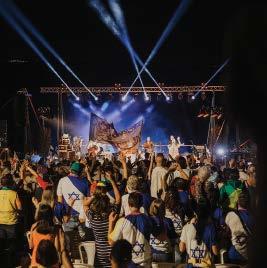
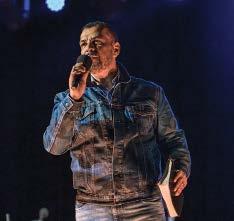
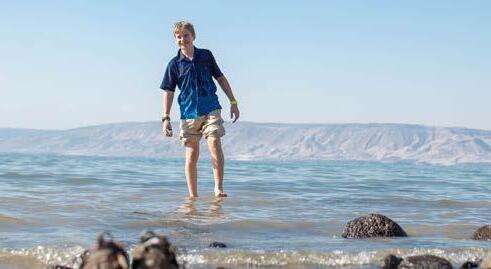
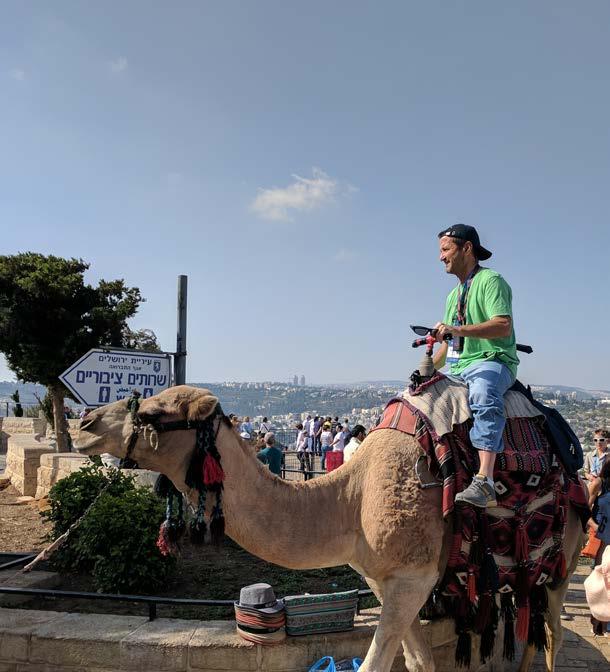
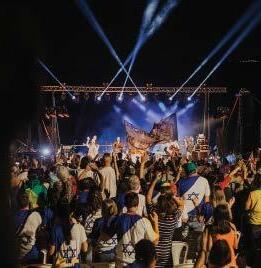
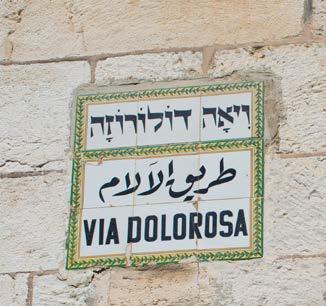
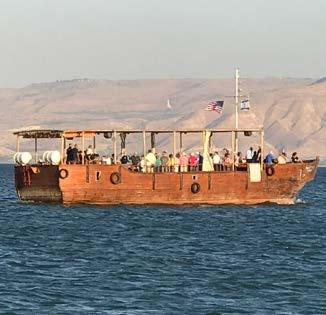
Two days in the Dead Sea Region • Three Days in Galilee Five days in Jerusalem • Parade of Nations Communion at Garden Tomb
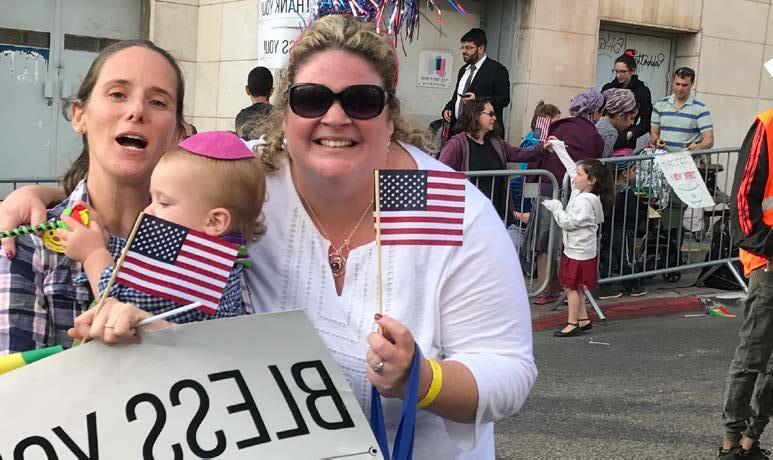
Jerusalem March Worship, Praise, & Prayer in Israel


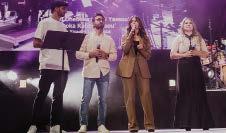
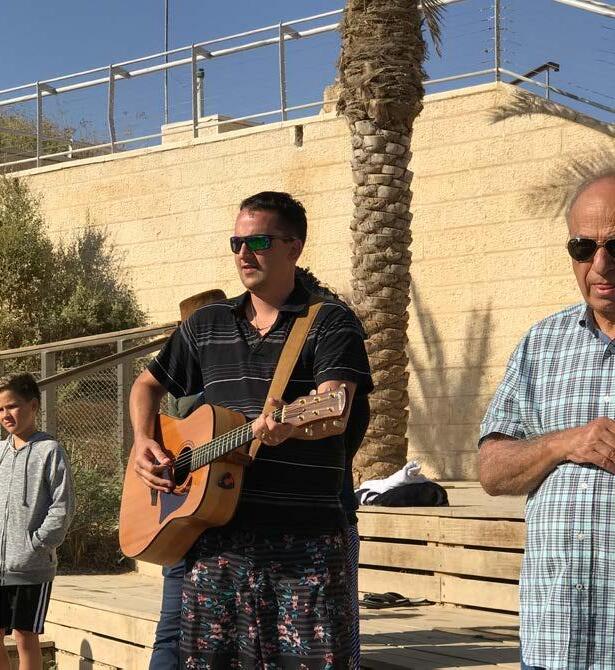
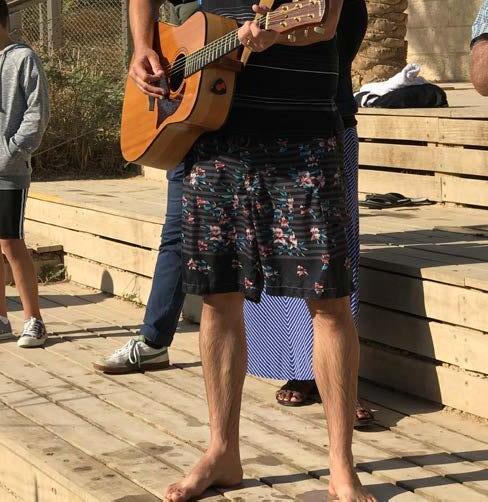

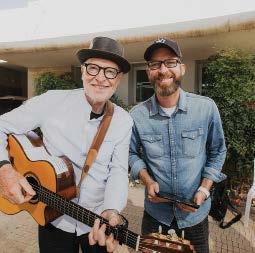

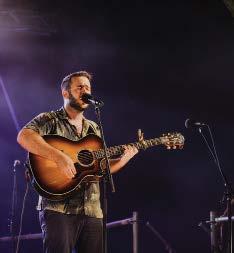
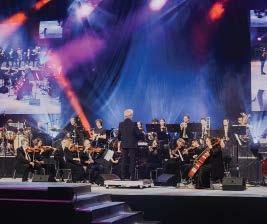
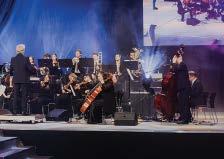


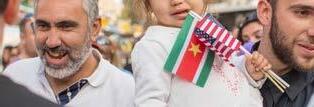
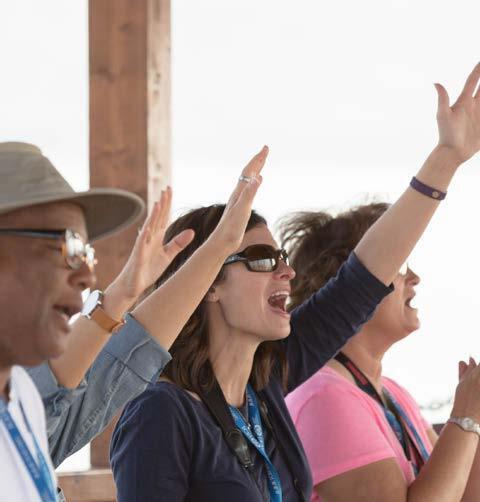
Psalm 47:7
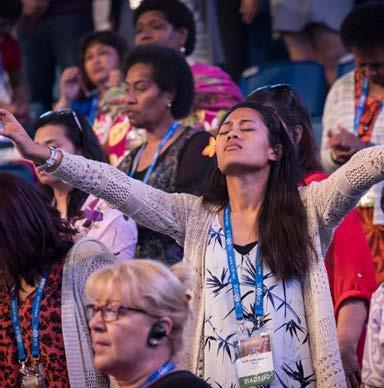
“For God is the King of all the earth; Sing praises with understanding.”
Travel to Israel for the Christian celebration of the Feast of Tabernacles and tour the land of the Bible. Join thousands of Christians from more than 90 nations to worship the King of kings in Jerusalem! There is no better time to visit Israel than during this Feast of the Lord! JOIN US FOR THE
us for the ICEJ
Feast
2023
Join
USA
Tour
www.icejusa.org/feast-tour




















 KAREN ENGLE, ICEJ USA MANAGING EDITOR
KAREN ENGLE, ICEJ USA MANAGING EDITOR


 BY DR. MOJMIR KALLUS, ICEJ VICE PRESIDENT FOR INTERNATIONAL AFFAIRS
BY DR. MOJMIR KALLUS, ICEJ VICE PRESIDENT FOR INTERNATIONAL AFFAIRS


 BY ANNALIESE JOHNSON ICEJ PUBLICATIONS/EVENTS REGISTRATION
BY ANNALIESE JOHNSON ICEJ PUBLICATIONS/EVENTS REGISTRATION













 By Dr. Susan Michael, ICEJ USA Director
By Dr. Susan Michael, ICEJ USA Director
































